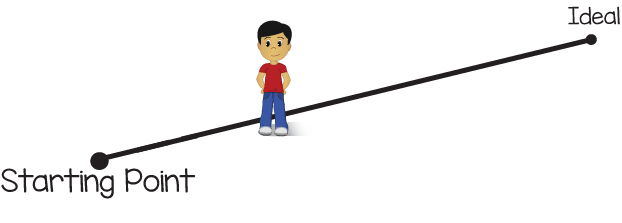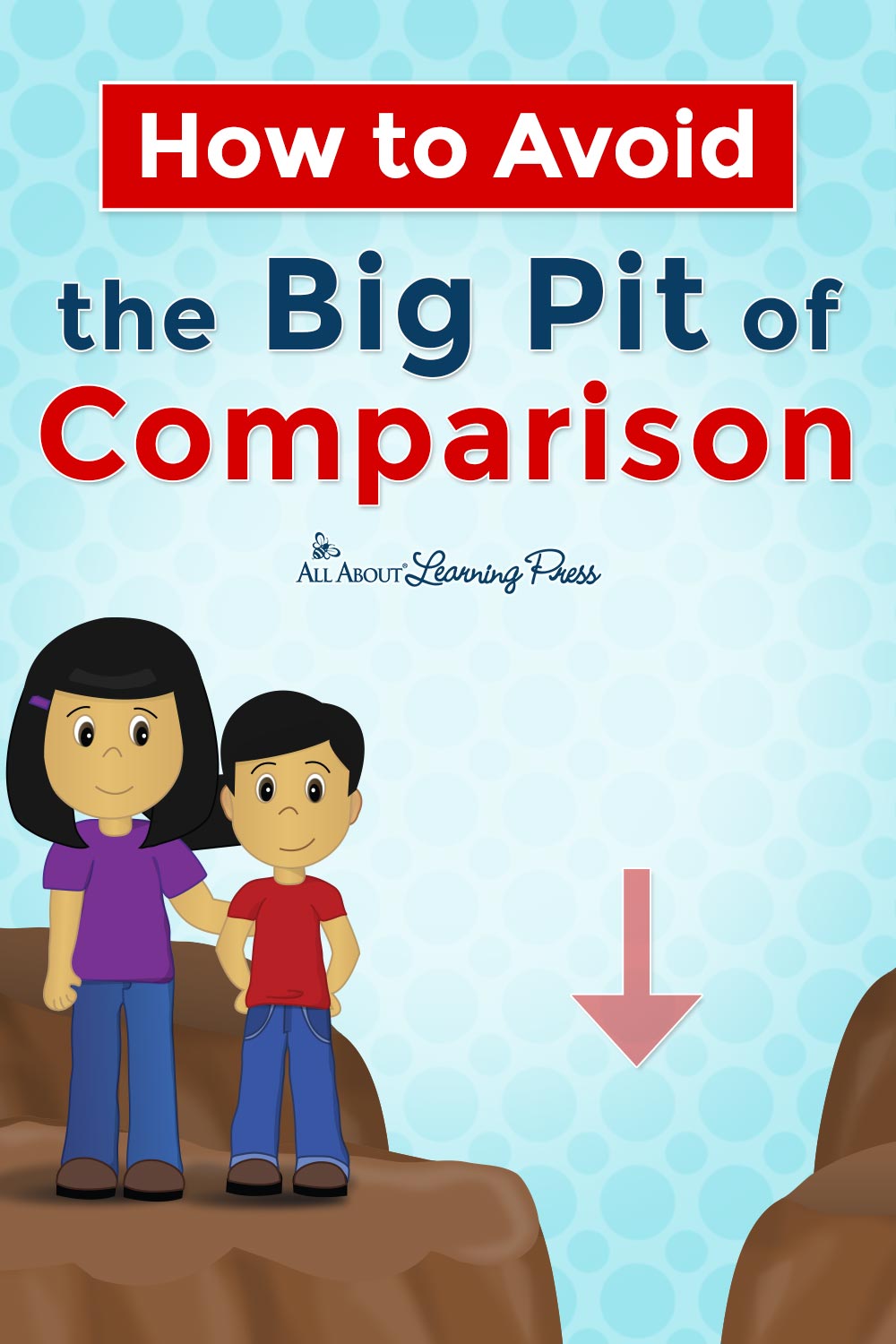How to Avoid the Big Pit of Comparison

“I’m worried my child isn’t making enough progress.”
Most homeschool parents feel this way at one time or another. We regularly hear from parents who express concern about the progress their child has made—or not made—in reading and spelling.
When we question the parent further, we often discover that the child has in fact made excellent progress, yet the parent doesn’t recognize that progress.
In these situations, however, the problem is actually much more likely to be related to the parent’s expectations for the child’s progress, rather than to the child’s actual progress. It is very easy to become too focused on “the ideal.”
What Is Your “Ideal?”
Your ideal may be different than someone else’s. Maybe your ideal is to have your child complete All About Reading Level 4 by a certain age or to have him spell as well as the child next door. Maybe your ideal has been influenced by what your child’s grandparents think about his progress. Or maybe it’s even thinking ahead to your child’s future college career with worried thoughts like, “How will he get into college if he can’t even spell proficiently?”
In all the cases above, focusing on the ideal can create frustration because, until your child actually reaches your ideal, you will always be focused on how far he still has to go until he reaches “it” … whatever “it” may be.

To varying degrees, envisoning your child’s future can serve you well because it helps you gauge what you need to do. After all, if you’re completely happy with the status quo, there would be no reason to teach your children every day.
But while focusing on ideals can help us set goals, it’s not a great way to measure progress in a motivating way. In fact, always comparing your child to the ideal can lead to disappointment … and the Big Pit of Comparison.
Stay Out of the Big Pit of Comparison
What is the Big Pit, you ask? This is the huge chasm between where your child’s abilities are now and where you want him to be.
The Big Pit is a bad thing. It’s bad for you and for your motivation. And it’s bad for your child, his sense of self-worth, his enthusiasm for learning, and his future progress.

So instead of this self-defeating way of looking at your child’s progress, let’s take a step back … no, let’s take a step up.
A Fresh Perspective
To better understand where your child is really at and to stay out of the Big Pit, it helps to get a bird’s-eye view of your child’s situation.

Look at the big picture from a vantage point where you can see the whole continuum, beginning with where your child started and ending with your ideal.
With this bird’s-eye view, you can see the ideal off in the distance, but you can also see how far your child has come.

From this vantage point there is a LOT to celebrate.
What I would encourage you to do is frequently look backward instead of always looking forward. Instead of comparing your child to where you want him to be, think about where he started out. Then you can see how much progress has been made.
When you give yourself a bird’s-eye view, you can look back and see the ten-year-old who was struggling to read a year or two ago, but is now reading fluently. You can picture the boy who spent two or three days on each spelling lesson but can now complete a lesson in a day. You realize that the child who cried through every single fluency practice sheet is now smiling through them.
This new vantage point provides an inspiring perspective that will help you and your child stay motivated … and encouraged. It changes everything, doesn’t it? Can you see the difference?
Do you ever fall into the Big Pit of Comparison? What successes has your child had so far?










Charity
says:Thank you for this post! Sometimes I fall into the pit of comparing MYSELF with other homeschooling moms. I’ll think, “they are so much kinder, patient, and loving to their kids than I am to mine”. That is not a healthy thought process…everyone has their challenges with homeschooling. It’s so nice to read all of the comments and stories others share! It reminds me that I am not alone on this journey.
Robin
says: Customer ServiceCharity,
I completely understand what you mean! When I first started homeschooling (22 years ago!), it seemed like every other mom was super organized, with color-coded-to-15-minute-intervals schedules, beautifully filled out lesson planners months in advanced, and so on. I’m naturally more of a go-with-the-flow kind of person. I struggled for a long while trying to be more like what I perceived other homeschool moms were, and in retrospect, it was such a waste of time and effort!
Anyway, it is good to take the big picture view and to address anything that may not be best for your children’s education. (For me it was a lack of consistency, and their thriving really took off when I made being consistent in learning a priority.) But it is equally important to acknowledge what benefits your children are gaining from your strengths.
Barbara Vickers
says:I am stuck in trying to find a good math and science books for my student. He has dyscalculia and is at a grade 2/3 learning the different ways to do math. I can’t find a good science book for him at all. Any help would be appreciated.
Robin
says: Customer ServiceBarbara,
I’m sorry your student is having such trouble with math and science. See if any of these recommendations will be a good fit.
__________
Math: there certainly are a lot of choices out there! Here are a few you could consider:
– Math-U-See. My coworker Merry and I have used this with math struggling students. It’s multi-sensory, incremental, mastery-based, and uses short video lessons.
– Teaching Textbooks. Marie liked this for her struggling math student. It is also incremental and uses computer-based lessons.
– Math With Confidence is a program that many of our customers like.
– Right Start Math is another multi-sensory program.
– Shiller Math is multisensory, Montessori-inspired, and open and go for parent.
– Singapore Math has strong visual components and is a solid math program. I found that it worked well for most of my kids.
– Math Mammoth. I have friends who use this and enjoy its straightforward approach to math.
– Elementary Arithmetic from Simply Charlotte Mason. My co-worker uses this because it fits their Charlotte Mason style. It’s very hands-on and visual, which works really well for her kids.
__________
Science: Here are a few you could consider that use incremental or hands-on methods to help students learn:
– Berean Builders – Science in the Beginning by Dr. Jay Wile (K-6) and the rest of the series. I used this and the lessons are short, each includes a hands-on experiment, and there are notebooking assignments for every lesson (things like drawing light hitting a flower and then reflecting off to a person’s eyes or pasting photos from magazines or online to show radiant, thermal, chemical, and mechanical energy).
– Nancy Larson Science (K-6). This is expensive but a friend of mine who uses AAR and AAS loves the hands-on and how the Teacher’s Manuals are laid out.
– Elemental Science. This is recommended in The Well-Trained Mind. Marie says that she and her children would have loved this curriculum when they were school-aged!
– Timberdoodle. They don’t have there own curriculum per se, but rather special in choosing the best science learning toys, kits, and curriculum on any market (they find things I’ve never seen anywhere else!).
I hope this helps some.
Natalie
says:I needed to read this today. We have decided to take a slow approach to learning, to allow for ample play time. However, I find it hard to be content with this daily, and thinking about progress versus what she doesn’t know, will be helpful.
Robin
says: Customer ServiceNatalie,
I understand your concerns. I have been homeschooling for well over 20 years, however, and I see from that perspective that progress is made with a little bit done consistently over time. Aim for short lessons in each subject daily, and amazing progress will come.
Jackie R
says:This was a great reminder. It’s kind of bummy to sit through conversations with moms speaking about their kids reading books when mine is still decoding cvc words, but then also being on the opposite end where some kids cant get letter sounds down. Ultimately, they’re all going at their individual pace, which is a big reason why I started homeschooling to begin with!
Robin
says: Customer ServiceSuch a great perspective, Jackie! And really, it doesn’t matter if a child takes off in reading in 2nd grade or 6th grade (or later), as long as they do take off. Keep up the great work!
Shalyse
says:This is such a good reminder. And not just for reading and spelling but for any subject. For us, it’s handwriting. My son despises it, but he is making progress (even if it’s slow).
Robin
says: Customer ServiceShalyse,
Yes! It is important to avoid comparison in so many areas, even beyond academics.
As for handwriting, have you seen our blog post on Dysgraphia: How can I help my child? Whether your son has difficulties with dysgraphia or not, the tips and suggestions there may be very helpful.
Meagan Marazzo
says:It is hard not to compare one child’s ability or growth with children of the same age. We have seen huge growth in spelling and reading since we started the All About Spelling Program!
Robin E.
says: Customer ServiceMeagan,
Yes, it can be difficult to not compare, but keeping the big picture in mind is more helpful in the long term. I am so pleased to hear that All About Spelling is working so well for you!
Jane
says:I’m so excited to start this program with my son. I think it’s going to set both of us up for success!
Robin E.
says: Customer ServiceSounds great, Jane! Let me know if you have questions about placement or anything else. I’m happy to help!
Amber Z
says:I sometimes end up doing this. We used a different reading curriculum last year and my son just wasn’t getting it. So even though he is in 2nd grade, I wanted to start with level 1 so he didn’t have gaps in his learning. He has actually come so far & loves All About Reading. But sometimes I think, maybe he should be further along than he is. I know I shouldn’t think like that and he is actually making so much progress. Thanks for the reminder.
Robin E.
says: Customer ServiceI’m glad that was helpful and encouraging for you, Amber. It’s wonderful to hear your son is making such progress! Keep up the great work!
Felicia
says:I had to learn early on that each child blooms when they are ready and to not worry about where my kids were compared to their friends.
Robin E.
says: Customer ServiceGreat point, Felicia. Thank you.
Megan Watts
says:Very good reminder, it’s so hard not to compare, but this is encouraging!
Robin E.
says: Customer ServiceI’m glad this was encouraging for you, Megan!
Megan Watts
says:Very good reminder. It is so hard not to compare! But this is encouraging.
Beth C.
says:This is very encouraging. Needed this today. Thank you!
Robin E.
says: Customer ServiceI’m glad this is encouraging for you today, Beth. You’re welcome.
Priscilla
says:I feel this very much. My parents are not completely supportive of us homeschooling, so this year is our “test” and we are going to compare how my daughter matches with the kids her age who are in school. It’s really stressful. But she just read her first book. I am so proud of her.
Robin E.
says: Customer ServiceI’m sorry you aren’t feeling fully supported in homeschooling, Priscilla. That would be stressful. However, please keep in mind that according to statistics reported in 2019, more than 60% of fourth graders in the United States were reading below proficient levels (sources found at the bottom of this article). The fact that your child is already reading is very good!
Stephanie
says:This article is uplifting. It is so hard not to compare your child with other children the same age, but we have to remember that they all learn at different levels. While your child may have trouble reading or spelling, they have other strengths that put them ahead of the game and they will eventually get to were they need to be. Thank you for the inspiration.
Robin E.
says: Customer ServiceI’m glad this article was encouraging for you, Stephanie. Such good points! Yes, everyone has strengths and weaknesses!
Kristin Meyer
says:Incredibly helpful, thank you!
Robin E.
says: Customer ServiceYou’re welcome, Kristin!
Allison
says:Thank you for all the helpful articles and extra free resources on top of an awesome curriculum. I’m so glad I found AAR and AAS. I like to film my kids reading every few months. Sometimes it’s hard to see how far they’ve come in the day to day because it happens little by little. But going back and watching those videos is so encouraging!
Robin E.
says: Customer ServiceWhat a great idea to compare videos of reading over time, Allison! Thank you for sharing it.
Katrina Brockavich
says:I try not to compare my kids to others, each other, or judge them by what people expect them to know at this age I don’t want to be judged or compared to anyone, so I wouldn’t want to do that to other people. All of my children learn best when they are given the chance to learn as much about the topic as they want in whatever way they can understand and retain the information.
Robin E.
says: Customer ServiceSo true! Thank you, Katrina!
Vicky
says:This is so helpful!! It’s an easy pit to fall into.
Robin E.
says: Customer ServiceI’m glad this was helpful, Vicky!
Rachel
says:The blogs are a great help and wonderful resource. Thank you for providing things to help us along but don’t cost extra. It means a lot.
Robin E.
says: Customer ServiceYou are so welcome, Rachel. It’s wonderful to here that the resources are used and enjoyed!
Claudia Matchynski
says:Both of my kids are at different reading levels. But they are both doing great!
Robin E.
says: Customer ServiceWonderful, Claudia!
Courtney Flanery
says:The pit of comparison is a stealer if joy! Definitely something I have and still struggle with. The progress my oldest had made within the last year is amazing to me and I am so proud!
Robin E.
says: Customer ServiceSo true, Courtney!
I’m glad to hear about the progress you have made with your oldest! Of course, you are proud!
Courtney flanery
says:Thank so much!
Priacilla
says:My 11 year old has always read and spelled above the average level but my 8 year old is struggling. It is hard not to compare her to her older sister when I know multiple factors affect their differences
Robin E.
says: Customer ServiceI understand what you mean, Priacilla. My first child learned pretty much everything easily, so the struggle my other four children experienced was all the more concerning in light of that, especially for my second child. But they all learned at their own pace and in their own way, and all succeeded. And, in some ways, those that struggled developed strengths that their brother never did, like the ability to help others that struggle.
Tiffany petrie
says:This is so encouraging! My seven year old is not reading yet and it worries me sometimes but I know he will get there!
Robin E.
says: Customer ServiceI’m so glad this was encouraging for you, Tiffany! I have had a couple of kiddos that were not yet reading at 7, so I understand. But they did finally master reading, and so will your child!
If you have questions or concerns, please let me know. I’m happy to help!
Melissa Mills
says:This e-mail is like a divine intervention of God telling me everything is going to be ok, because I have you in great hands. I just need to take it a day at a time.
Robin E.
says: Customer ServiceI’m so glad this was such an encouragement and inspiration for you, Melissa!
April Bean
says:Thank you! I needed this today!
Quick question … do you have a range of time that you estimate the various levels to take? IE Should they each be for one school year, more or less?
And thank you for all you do! This curriculum has moved the dial significantly for our son!
Robin E.
says: Customer ServiceI’m so happy to hear that it’s been helpful for your son, April!
As for how long a level should take, it depends on many factors. Our programs are designed to be used at each child’s unique pace. Sometimes that means a level will take just a couple of months, and sometimes it means a level will take a year and a half or more.
On average, the All About Reading levels seem to take about three-quarters of a year to a full year, but again that is an average. Some master the material faster and some need more time. The higher levels of All About Spelling average about the same, but the lower levels tend to go a bit faster. It all depends on your student’s age, previous experience, possible learning disabilities or giftedness, and more.
We recommend working in All About Reading for 20 minutes a day five days a week and All About Spelling for 15-20 minutes a day also five days a week. You will start each day with reviewing, work until time is up, and then pick up where you left off the next day.
I hope this helps, but let me know if you have additional questions or need more information.
Karen Mahon
says:Marie, you must love children. You seem to understand them. Your methods make sense. I am working with my granddaughters on language – reading, writing, spelling, grammar, and all that goes with it. They all have their own learning speed you might say and skill levels. Thank you much for all your insight and sharing.
Robin E.
says: Customer ServiceYou are so welcome, Karen! Marie understands the struggle that learning to read and spell can be. Marie’s son is severely dyslexic, and being told by experts that he would never learn to read led directly to her creating All About Reading and All About Spelling. You can see a short video about her son’s story, Failure is Not an Option.
Catherine
says:My daughter has ASD and dyslexia, the hill we are climbing is steep. I’m finally learning to focus on each moment, enjoy my daughter, and to stop looking for the finish line. “A watched bloomer doesn’t bloom.” Thanks for the reminder!
Robin E.
says: Customer ServiceOh, I love that, Catherine! As a mom of children with learning disabilities myself, I understand the feeling when you still have so much hill to climb. But now that we are at or near the top, there is not only joy but such a strong feeling of accomplishment!
Betty
says:This is the first time I understand that I have a problem with my daughter progress not her ,she has done a great job and progress from where she was at first I just couldn’t see it thank you it help a lot
Robin E.
says: Customer ServiceI’m glad this was helpful for you, Betty. It can be hard to let go of the idea of where a child “should” be. I’m very pleased to hear that your daughter is making good progress.
Austin
says:Our family really struggles with the pit of comparison. After getting custody of our little guy it was hard not to compare him to his peers as he is academically several years behind them. We needed to advocate for his educational needs which meant all too often we were focused on what he couldn’t do instead of what he can do. He’s made amazing progress with AAS and I can’t wait to see what he accomplishes in the future.
Robin E.
says: Customer ServiceAustin,
Sometimes it takes a bit of comparison to know when your child needs more help. But it sounds like you have the most important thing down; you are looking at the progress your little guy has made! I’m pleased to hear All About Spelling is helping him gain progress.
Lily
says:Are you offering fee excess during the Covid 19 pandemic for teachers to use with their class?
Robin E.
says: Customer ServiceLily,
We have a blog post about tht, COVID-19 Quarantine Schooling Resources.